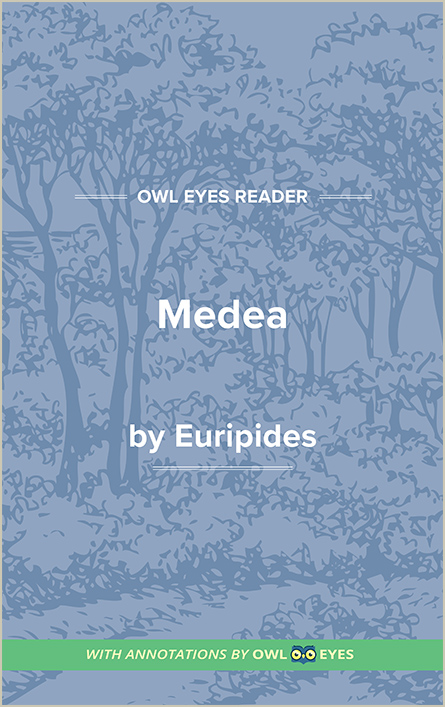Analysis Pages
Character Analysis in The Medea
Medea: The title character and protagonist of the play, Medea is a proud, self-possessed, and powerful woman who moves from suicidal despair at the beginning of the play to homicidal revenge. A powerful sorceress, she single-handedly grants Jason success in the myth of Jason and the Golden Fleece. In The Medea, it’s easy to sympathize with her plight and understand her anger at being abandoned. However, while her choice to murder her children, Glauce, and Creon can paint her as the villain of the play, to an audience in ancient Greece, her actions might have seemed slightly more rational. She ends Jason’s family line, a punishment that fits the crime he commits in breaking his vows to his family for personal gain. The chorus does protest Medea’s actions, which suggests that they are not entirely condoned. But unlike other heroes in tragedies, Medea is not ultimately punished for her crimes: her grandfather, the god of the sun, gives her a chariot pulled by dragons to escape Jason’s vengeance. Her ability to commit the murders and rise into the sunset at the end of the play suggest that the audience is supposed to sympathize with Medea.
Jason: Jason is Medea's husband and the King of Iolcus. He is generally considered the antagonist to Medea's protagonist, because his actions cause the tragedy that unfolds in the play. He defies the ancient Greek concept of oikos and therefore destroys his own honor. Since oikos is the contract of the home, the man’s role was to faithfully protect those who lived under his roof; the woman’s role was to raise children and care for the home. The story can be read as a warning to men who seek to defy oikos by breaking their vows for personal gain. Like Jason, they will be condemned not only by fate but by society as well.
Creon: This is the King of Corinth and the father of Glauce, the woman for whom Jason abandons Medea. This is not the same Creon who ruled Thebes in the legend of Oedipus. Creon of Corinth was featured in more of Euripides's plays. However, there are no extant copies of these manuscripts. Modern audiences only know about these plays through the Bibliotheca, a compendium of Greek myths and legends written in the second century CE. Creon is kind to Jason and Medea. His decisions to exile Medea and allow Jason to marry his daughter set the events of the play in motion.
Character Analysis Examples in The Medea:
The Medea
🔒"Yet underneath . . . nay, all the tale of it Were graceless telling; how sheer love, a fire Of poison-shafts, compelled thee with desire To save me...." See in text (The Medea)
"I saved thee. I saved thee— Let thine own Greeks be witness, every one That sailed on Argo..." See in text (The Medea)
"clinging to Creon..." See in text (The Medea)
"And the voice of my brother's blood..." See in text (The Medea)
"They shall not take my little ones alive To make their mock with!..." See in text (The Medea)
"For never child of mine shall Jason see Hereafter living, never child beget From his new bride..." See in text (The Medea)
"Now God in heaven be witness, all my heart Is willing, in all ways, to do its part For thee and for thy babes...." See in text (The Medea)
"Poor, poor right hand of mine, whom he Did cling to, and these knees, so cravingly, We are unclean, thou and I; we have caught the stain Of bad men's flesh . . . and dreamed our dreams in vain...." See in text (The Medea)
"Here am I To help thee, woman, pondering heedfully Thy new state...." See in text (The Medea)
"essay..." See in text (The Medea)
"Not that! Not that! . . . I do but pray, O King . . ...." See in text (The Medea)
"Nor all thy crafts shall help thee..." See in text (The Medea)
"Ah, him out of my heart I hate; but thou, meseems, hast done thy part Not ill. ..." See in text (The Medea)
"Which, ere yet it be too late, I sweep aside. ..." See in text (The Medea)
"Hellas..." See in text (The Medea)
"Yet her eye— Know ye the eyes of the wild kine, The lion flash that guards their brood?..." See in text (The Medea)
"That fell sea-spirit, and the dire Spring of a will untaught, unbowed. Quick, now!—Methinks this weeping cloud Hath in its heart some thunder-fire,..." See in text (The Medea)
"Oh shame and pain: O woe is me! Would I could die in my misery!..." See in text (The Medea)
"He dreameth of the bed Of this new bride, and thinks not of his sons...." See in text (The Medea)
"Of father, and land, and home, forsook that day For this man's sake,..." See in text (The Medea)

